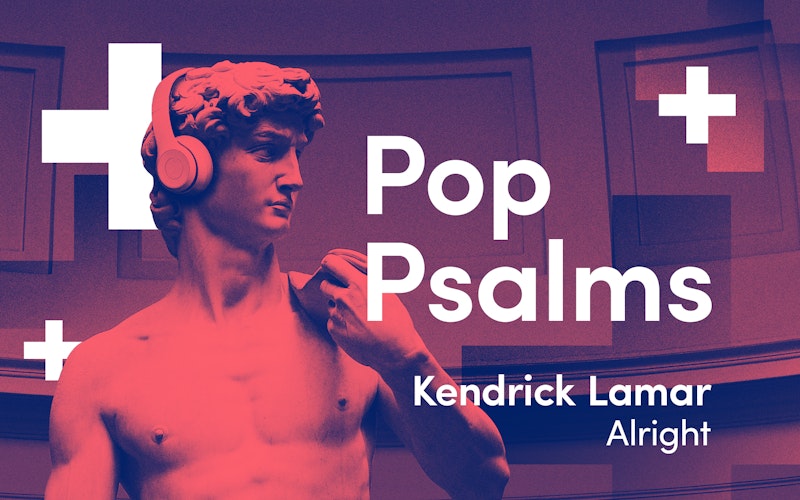
Music
Pop Psalms: Kendrick Lamar's “Alright”
Editor's note: Our free Pop Psalms ebook, featuring all 12 essays in one place, is available here.
“If God got us then we gon’ be alright.”
In 2015, Kendrick Lamar’s hit “Alright” became the unofficial anthem of the nascent Black Lives Matter movement. Since then “Alright” has maintained, if not outright increased, its cultural importance and emotional impact as a prophetic song of protest. While the song has remained in our cultural consciousness—and personal playlists—on the merits of Lamar’s aggressive, nimble flow and its relevance to the seemingly unending cases of police brutality against Black people, an overlooked aspect of the song’s enduring power comes from its similarity with the psalms—the prayers and songs of Israel, which shaped and vocalized the resilient faith of the people of God.
The Book of Psalms is nothing if not drenched in honesty. In fact, the psalms often showcase how bracing honesty can live quite comfortably with God-centered hope, with the former often producing a deeper sense of the latter. In Psalm 43, the psalmist mourns a sense of abandonment by God (“Why have you rejected me?”) because of the schemes of oppressive and ungodly enemies. Throughout the psalms, we find writers who pull no punches about their bleak circumstances, while simultaneously holding on to hope in God. Lamar does the same. After opening with the declaration, “If God got us then we gon’ be alright,” Lamar is painfully, and at times profanely, honest about the condition of Black folks in America:
Wouldn't you know
We been hurt, been down before, n***a
When our pride was low
Lookin' at the world like, "Where do we go, n***a?”
It’s precisely this rare blend of honesty about injustice and the refusal to relinquish hope that gives “Alright” its triumphant edge. The notes of victory that Lamar raps with conviction—“If God got us then we gon’ be alright”—are the opposite of trite religiosity; they’re well-earned and meaningful because of the stark realities of injustice spoken through the song. In this sense, “Alright” has a psalm-like quality, vocalizing the grim realities of hardship and a hope that’s distinctly rooted in God. “Alright,” like the psalms, teaches us that honesty and faith are designed to co-exist.
“Alright,” like the psalms, teaches us that honesty and faith are designed to co-exist.
The psalmic resonances of “Alright” emerge most during the song’s chorus. As the drums drop out, Lamar’s voice takes center stage as he narrates an all-too-real slice of Black experience in America, including a sense of abandonment and existential homelessness (“looking at the world like, ‘where do we go, n***a?’”). Lamar’s grim honesty culminates in a shift toward both violent and religious impulse:
Lookin' at the world like, "Where do we go, n***a?”
And we hate po-po
Wanna kill us dead in the street for sure, n***a
I'm at the preacher's door
My knees gettin' weak and my gun might blow
But we gon' be alright
Facing injustice and despair, Lamar vocalizes faith and religion as a refuge from an unjust world and a means for overcoming temptation toward retaliation (“my knees getting weak and my gun might blow”). Where the psalmist seeks refuge at “the altar of God,” Lamar seeks the modern equivalent, turning to “the preacher’s door.” Instead of death by police or violence by his own hand, the chorus exults: “But we gon’ be alright.” It’s at this point that the drums return, a new voice emerges, and the chorus explodes in tones of triumph, musical and lyrical, both of which are palpably spiritual:
N***a, we gon' be alright
N***a, we gon' be alright
We gon' be alright
Do you hear me, do you feel me? We gon' be alright
N***a, we gon' be alright
Huh? We gon' be alright
N***a, we gon' be alright
Do you hear me, do you feel me? We gon' be alright
This is a God-centered hope achieved through gritty honesty and a Godward gaze. The rhetorical questions are again reminiscent of Psalm 43, where the psalmist asks, “Why, my soul, are you downcast? Why so disturbed within me? Put your hope in God, for I will yet praise him, my Savior and my God.”
The great British preacher D. Martyn Lloyd-Jones once remarked that this pattern of rhetorical question followed by God-centered declarations revealed “the main art in the matter of spiritual living.” Based on examples from Psalms, Lloyd-Jones declared, “You have to take yourself in hand, you have to address yourself, preach to yourself, question yourself . . . you must go on to remind yourself of God, who God is, and what God is and what God has done, and what God has pledged himself to do.” Lamar’s chorus powerfully employs this same discipline of questioning and declaring. Where the psalmist might ask, “Why, my soul, are you downcast?” Lamar goes colloquial: “Do you hear me, do you feel me?”
The outcome of both the psalmist and Lamar’s rhetorical questioning is a self-talk and communal exhortation toward God-centered hope. In response to the rhetorical question, Lamar’s chorus, like that of the psalmist, begins to preach and declare. Each chorus declaration is another note of defiance and hope—defiance against the injustice that seeks to kill and hope in the God who walks with us even in the valley of the shadow of death. With psalm-like resonance, Lamar reminds us that because of the steadfast love of God, we can say with honesty and hope, despite the chaos that engulfs us, that “if God got us then we gon’ be alright.”
Topics: Music